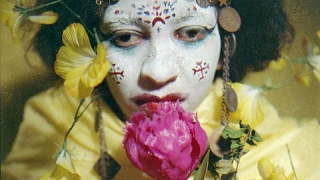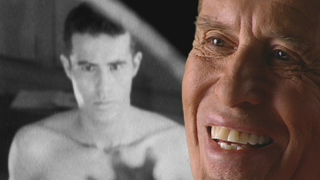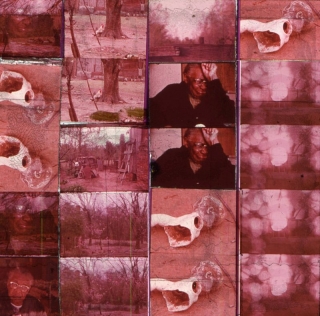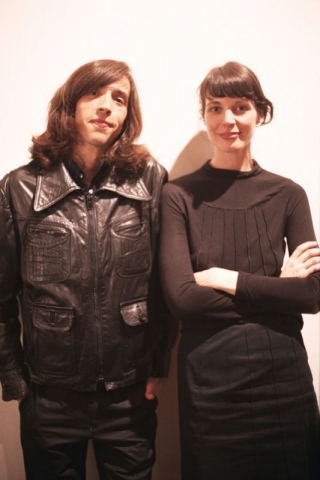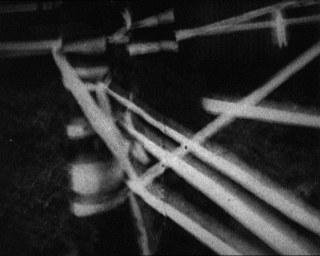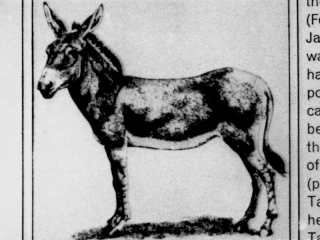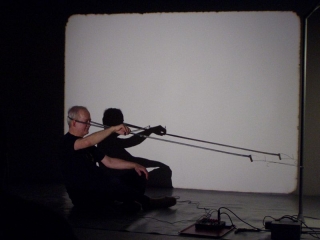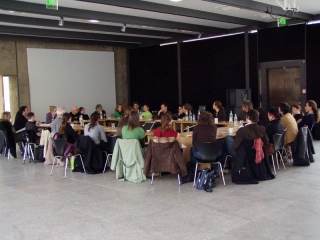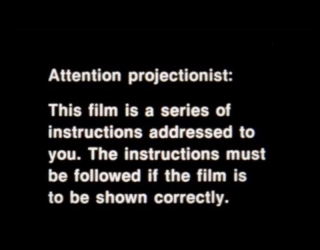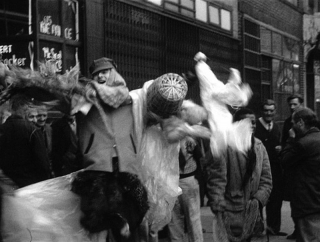Date: 28 October 2006 | Season: London Film Festival 2006 | Tags: London Film Festival
JACK SMITH & THE DESTRUCTION OF ATLANTIS
Saturday 28 October 2006, at 9pm
London National Film Theatre NFT3
‘The only person I would ever copy. He makes the best movies.’ (Andy Warhol)
Mary Jordan, Jack Smith & The Destruction of Atlantis, USA, 2006, 96 min
Diving headlong into the exotic world of Jack Smith, this is a ravishing celebration of a seminal figure of contemporary art, experimental theatre, fashion, film and photography. A devotee of ‘moldy glamour’, Smith was shooting fanciful tableau vivants in 1957, later naming his ensemble the ‘Superstars of Cinemaroc’ way before Warhol had a Silver Factory. His ethereal masterpiece Flaming Creatures is an epic fantasy, featuring blonde vampires and bohemians cavorting amid a tangle of naked bodies. Fêted by Fellini, but denounced by Playboy for ‘defiling at once both sex and cinema’, the film was became a totem in the battle against censorship. Dismayed and resentful, Smith reacted to this unwanted attention by never completing another film. To become a product was to be embalmed. Returning to the ephemeral medium of performance, he appeared amongst piles of meticulously arranged garbage with Yolanda, a toy penguin with jewel-encrusted brassiere. Utterly opposed to the concept of rented accommodation, Smith railed against ‘landlordism’, transforming his dilapidated apartment into an homage to Babylonian architecture. This documentary opens up Ali Baba’s cave, mixing commentary from friends and enemies with the glistening treasures of Smith’s own creation. An abundance of rare photographs, footage and audio bear testament to his uniquely baroque vision.
Also Screening: Thursday 26 October 2006, at 1:15pm, London NFT2
PROGRAMME NOTES
JACK SMITH & THE DESTRUCTION OF ATLANTIS
Saturday 28 October 2006, at 9pm
London National Film Theatre NFT3
JACK SMITH & THE DESTRUCTION OF ATLANTIS
Mary Jordan, USA, 2006, video, colour, sound, 96 min
In 1964, the year Lenny Bruce was convicted of obscenity after a New York stage appearance, Jack Smith’s pansexual phantasmagoria Flaming Creatures was busted by the NYPD. It was eventually banned in 22 states and four countries; as late as 1968, Lyndon Johnson’s Attorney General was impounding prints of the movie.
Documentaries need self-dramatizers, and being a diva was Jack Smith’s art and life. At the start of Mary Jordan’s irresistible documentary Jack Smith and the Destruction of Atlantis, the artist’s reedy voice is heard intoning, “Doctor, doctor, tell me, please: Is my brain a germ or a disease?” Late in life, he says of his work: “I was knocking myself out to make this stuff. And I always assumed that people would see this and have pity and give me a little support. [Now he shouts:] They didn’t!”
Smith was inspired as a kid by the Scheherazade schlock of B-movie queen Maria Montez. As a director, he renamed one of his drag stars Mario Montez and starred him in no-budget avant-garde movies of delirious (and now endearing) Caligulan excess. Both Mario and Jack went to work for Andy Warhol, who called Smith “the only person I would ever copy. He’s just so terrific, and I think he makes the best movies.” Warhol’s Factory and the films that emerged from it – Chelsea Girls and the rest – might not have existed without Smith’s influence. Consider that a curse or a blessing.
With Mephistophelean good looks swathed in leopard-skin couture, Smith was a ready-made icon of the Underground, and an easy magnet for police and politicians. “Moral decay is spreading through our country and our society,” declaimed one bluenose, brandishing a poster for Flaming Creatures – thus giving priceless free publicity to the film he meant to denounce.
What was the big deal? Languid displays of male and female genitals. As one of Smith’s avatars, John Waters, says: “Seeing a limp penis – in an arty way, in a way that was intellectual – was revolutionary. The police came because of it! Imagine, calling the cops because you saw a dick in a movie.” The furor made Smith notorious but not famous. Within a few years of the Flaming Creatures fracas, new and more lurid displays of artistic obscenity were on display without police interruption. Smith kept at his mission for another quarter century, but audiences didn’t always come. Yet he soldiered on – even, one night, when no paying customers showed up for one of his live performances. He did it anyway, all seven hours.
Avant-garde art is hard; dying is easy. In 1991, languishing with a fatal bout of AIDS in a Manhattan hospital, the lifelong kvetch was suddenly buoyant. The longtime starving artist told playwright Ron Tavel, “It’s the best food I’ve had in my life.” His mind has sustenance too: dreams of his eternal movie goddess, Maria (not Mario) Montez. It would be lovely if lots of people saw this documentary about an avant-gardist who loved old Hollywood movies. It might remind them that there are lands beyond today’s blockbusters and timid dramas that are worth visiting and, for an hour and a half, living in.
(Richard Corliss)
Back to top
Date: 29 October 2006 | Season: London Film Festival 2006 | Tags: London Film Festival
ANGER ME
Sunday 29 October 2006, at 7pm
London National Film Theatre NFT3
Elio Gelmini, Anger Me, Canada, 2006, 72 min
A portrait of Kenneth Anger, legendary pioneer of independent film-making. Raised in Hollywood, a spell as the Changeling Prince in A Midsummer Night’s Dream (1935) provided his first taste of the fantasy world of the movies. The nine films Anger made between 1947 and 1980 are shown together as the ‘Magick Lantern Cycle’, emphasising his belief in cinema as magical weapon. An authority on Aleister Crowley, his dazzling montage invokes myth and ritual, exploring taboo subjects and popular culture with a complex iconography. From the homoerotic fantasy Fireworks to the transcendental Lucifer Rising, his influence reaches beyond the avant-garde and into the mainstream, touching the work of Jarman, Lynch, Scorsese and countless others. Anger’s fascination with film history, memorabilia and scandal eventually led to the bestseller Hollywood Babylon, a dark exposé of Tinseltown’s seamy side. He inadvertently invented the music video with Scorpio Rising, and his acquaintances ranged from Anaïs Nin and Alfred Kinsey to the Rolling Stones. Anger Me takes the form of an extended monologue, in which this visionary artist talks at length about his extraordinary life and remarkable body of work.
Also Screening: Friday 27 October 2006, at 1:45pm, London NFT2
PROGRAMME NOTES
ANGER ME
Sunday 29 October 2006, at 7pm
London National Film Theatre NFT3
ANGER ME
Elio Gelmini, Canada, 2006, video, colour, sound, 72 min
The documentary Anger Me is the story of the life, literary and motion-picture accomplishments of Kenneth Anger, a pivotal figure in the history of experimental film. An innovator and a pioneer, he literally blazed his own trail. Considered to be one of the major personalities of the 1960s and 1970s underground art scene, Kenneth defined himself as a ‘cinematographic magician’ and his cinema as a ritualistic form. Anger’s films have taken audiences places where only great film poets can arrive. In 1947 in Los Angeles, while his parents were away, a young Kenneth took his family’s film camera and shot a short, dramatic film entitled Fireworks, which is now considered one of the seminal works of experimental film. Expressive, imagistic, sexually charged, and made with the help of friends (and apparently without a script), Fireworks brought to the screen an unconstrained vision and an almost unbelievable candor. Kenneth Anger also led in the field of visualization of homoerotic imagery. Fireworks was a film that went beyond maturity and sexual conscience – an extraordinary event considering that it was made in 1947. Kenneth did not cross over to commercial cinema. Throughout his career he has been completely devoted to uncompromising expression. Since the 1960s, Kenneth Anger’s films have been the subject of many books, film panels and film theory courses. Although he has never made a commercial music video, he has even been called the ‘Godfather of MTV’.
Kenneth Anger: The Man, the Filmmaker, and the Author
Many things have been said and written about Kenneth Anger, however, meeting the man only serves to add greater mystery to his reputation. He seems to disdain casual conversation, but when asked a question about his past or his work, he comes alive, as though he is an actor who just heard the word ‘action’. Kenneth Anger seems to have very little interest in his place in history – film history, literary history, homosexual history or otherwise. As Anger himself likes to put it: ‘I just made Kenneth Anger films’. Kenneth Anger is particularly well known for his films Fireworks (1947), Inauguration of the Pleasure Dome (1954), Scorpio Rising (1963) and Lucifer Rising (1970-81). He is less known as an author. In 1959, primarily to make money, Kenneth Anger published the first of a ‘tell-all’ series of books entitled ‘Hollywood Babylon’. His objective was to demonstrate the theory that Hollywood is a relentless machine, always ready to swallow and destroy whomever oversteps allowed boundaries in the search of fame, glory and celebrity.
Anger’s filmmaking style
Anger’s films incorporate the stylistic and expressive techniques of film masters such as Sergei Eisenstein, Abel Gance and D. W. Griffith. Carel Rowe offers the following thoughts on how Kenneth Anger inherited and put into practice the lessons of the great Russian master, Eisenstein: “The importance of Anger’s use of Eisensteinian principle is that it is not reduced to a craft, a trick in time, but maintained as an artistic vision. Art comes from the filmmaker’s reassembling of the splinters of time and space with the inclusion of the intellectual, psychological, or emotional content of the event. The collision of two separate images creates a third distinct impression to the viewer. Similarly, the blending of two dissimilar images into one accumulative essence yields a poetically metaphoric statement on that which is portrayed. This is the artistic importance of Eisenstein’s theory. Its potential is rarely realized in film, and even more rarely as true to theory as in Anger’s films.”
Influences on future generations of filmmakers
Anger’s film Fireworks is considered by many to be the starting point for the only movie ever made by Jean Genet, Un Chant d’Amour (1950). In Paris, Jean Cocteau, who had been much affected by Fireworks in the 1950s, called Mr. Anger and gave him permission to make a movie of his ballet, ‘Le Jeune Homme et la Mort’. Although Kenneth Anger approached many producers with Cocteau’s letter, none of them were interested, as all of Cocteau’s films had lost money. Contemporaries like Stan Brakhage, and Harry Smith were influenced by and expanded upon Kenneth Anger’s approach in what was known as the ‘underground’. Later on, this ‘underground’ influenced Martin Scorsese, the contemporary mainstream exponent of this expressionistic style, who openly acknowledges Kenneth Anger’s influence on his film technique.
Cinema as ‘magick’ and ritualistic form
Kenneth Anger has always defined himself as a ‘cinematographic magician’ and declared that his intention was that of projecting his films directly into the minds of the audience. Anger further credits the use of esoteric symbolism, prevalent in his films, to Aleister Crowley (1875-1947), the great magician, advocate of Gnosticism and neo-paganism. Crowley was a highly controversial, complex and fascinating figure of the 20th Century. Anger also consistently referenced the French poets Charles Baudelaire (1821-67) and Arthur Rimbaud (1854-91), the initiators of European Symbolism.
Aleister Crowley – Céfalù, Italy
Kenneth Anger was greatly influenced by the writings of Aleister Crowley, who lived for three years in Céfalù, in an 18th Century farmhouse, which he called the Abbey of Thelema. It was there that he put into practice the principles of his neo-pagan religion, essentially ‘Do what thou wilt shall be the whole of the Law’. On May 1, 1923, Crowley, already a notorious figure, was expelled from Italy by the order of Mussolini’s police after an accidental death on the site. Anger himself visited Céfalù years later and documented what was left of the paintings and objects.
(Elio Gelmini)
Back to top
Date: 29 October 2006 | Season: London Film Festival 2006 | Tags: London Film Festival
SHINE ON
Sunday 29 October 2006, at 9pm
London National Film Theatre NFT3
Luther Price, Same Day Nice Biscotts, USA, 2005, 6 min
A bleak but touching incantation composed from 13 identical prints of an early 70s documentary on elderly Afro-Americans. Time has taken its toll on the raw material too: now faded and worn, it is steeped in pathos.
Ken Jacobs, Krypton is Doomed, USA, 2005, 34 min
The original Superman radio play from 1940 accompanies the mind-bending ‘Nervous Magic Lantern,’ a filmless projection system that twists light into a perpetually throbbing mass of impossible depth. Presented by the film-maker as a metaphor for the onset of WWII, the apocalyptic narrative could be read as allegory for the present, a world of instability with the potential of environmental collapse.
Courtney Hoskins, The Counter Girl Trilogy, USA, 2006, 6 min
In an inventive response to the cosmetics industry, Hoskins has created imagery from some unusual materials discovered while working as a sales assistant on a make-up counter.
Dietmar Brehm, Blah Blah Blah, Austria, 2006, 13 min
Hotwiring history, the film-maker excavates his image bank of 16mm footage to reveal an archaeology of clandestine pursuits that hovers between ennui and agitation. Brehm’s week beats your year.
Barbara Sternberg, Surfacing, Canada, 2005, 10 min
An exodus of ghostly footsteps pass through the frame beneath layers of scratched emulsion, suggesting the transience of being and a state of emergence beyond the everyday.
Michael Robinson, And We All Shine On, USA, 2006, 7 min
‘An ill wind is transmitting through the lonely night, its signals spreading myth and deception along its murky path. Conjuring a vision of a post-apocalyptic paradise, this unworldly broadcast reveals its hidden demons via layered landscapes and karaoke, singing the dangers of mediated spirituality.’
PROGRAMME NOTES
SHINE ON
Sunday 29 October 2006, at 9pm
London National Film Theatre NFT3
SAME DAY NICE BISCOTTS
Luther Price, USA, 2005, 16mm, colour, sound, 6 min
A mournful dissolving jewel set in bruised magenta sends out votive glints of dying light. A lone bird chirps and branches cover our eyes. Working from a stack of abandoned multiple film prints (nearly identical and close to thirteen in number), Luther Price makes reiterative loops that underline futility, echo hope, and mark every camera movement with the vain promise of fresh outcome and inevitable predestination. (Mark McElhatten)
KRYPTON IS DOOMED
Ken Jacobs, USA, 2005, video, colour, sound, 34 min
In his 5th floor walk-up on the Lower East Side, Jack Smith was determined to complete the beautification of his kitchen cabinet. AIDS was pressing. His friends pitched in, accepting slave status. Jack demanded this and Jack demanded that but because he wanted it perfect (as he had wanted his films to be perfect), and because perfection proved elusive, the remodeling finally had to be abandoned. Each friend going his or her own sad way. We are living under the imminent threat of GODS. The Republican ploy of allying with the religious right for votes is proving shortsighted (grasping individuals tend to be shortsighted) and, as in Iraq, our own religious crazies are now avid for fulfillment. Of prophecy. You’ve got to hand it to those who resist, for the sake of the grass and the animals and the children, and for the preservation of the occasional work of art among the Fabergé eggs, and who knows but that they will succeed against all odds and swerve their respective societies away from sure doom. We like to think so, and it’s easy to, after a lot of movies and the fact that all the living are beneficiaries of the ones who made it through – through normal attrition, that is, all those Papas and especially Mamas that did succeed in sending forward their young. In the late 1930s two Jewish teenagers came up with the story of a couple that sent their infant child on a lone trip of escape through space from an exploding planet. We all know the story: the boy would survive on Earth but would have to keep his identity secret. Were Joe Shuster and Jerry Siegel dreaming out loud? Was Krypton the Old World heading into WWII and was the child escaping the fate of the Jews of Europe? The Jews then, all of us now. Jack’s friends failed to convince him to make a will. ”Why bother?” he asked. ”To protect your work in the future.” ”The future?” Jack replied, “The future will be worse.” (Ken Jacobs)
THE COUNTER GIRL TRILOGY
Courtney Hoskins, USA, 2006, 16mm, colour, silent, 6 min
To make ends meet, I took a job as a makeup counter salesperson. At first, I found this employment to be very satisfying. I was able to smell perfumes all day and ‘paint’ faces with makeup. After all, the human face is a fascinating canvass. The most subtle change can have dramatic effects (for example, it is amazing what a small touch of purple on the eyelids can do for green eyes) ! One day, that bottle of perfume came crashing down on the tile floor. The stench of reality woke me from my drugged state. I was required to go through several training seminars given by the cosmetics corporate giant. Nestled comfortably in the Rocky Mountains, I sat in horror as the ‘rep’ went over our ‘job duties’. My job went from ‘makeup artist’ to ‘scam artist’ right before my eyes! I learned that the average woman in Western society uses twenty cosmetics products each morning. I learned that this ‘average woman’ will also spend money she doesn’t have on cosmetics before spending it on anything else. Most disturbingly, I learned how to manipulate women by playing off of their insecurities. It’s no wonder these companies are so powerful. I couldn’t immediately quit my job, so I tried to make the best of it. One day, I happened upon three amazing shades of lip gloss that were hidden away in a drawer. Although they were for sale, they were not on the display wall. These particular lip glosses contain cholesterol, which in 1888, Fredrich Reinitzer discovered could be manipulated to exist as a new state of matter. He soon coined the word ‘liquid crystal’. I had been trying to purchase liquid crystal materials for my films for some time. I had only managed to find one or two different types. Because the materials are used in computer screens (and, as I learned, lip gloss), they are kept under wraps. I would never have guessed that such incredible materials would have fallen into my lap while working one of the worst jobs I have ever had. (Courtney Hoskins)
BLAH BLAH BLAH
Dietmar Brehm, Austria, 2006, 16mm, colour, sound, 13 min
An essay on restlessness: Blah Blah Blah (based on a song by Iggy Pop: Dietmar Brehm “never really liked it”, but likes it for that very reason) contains a large number of various kinds of shots in a montage which alternates between contemplative scenes and rapid cascades of images. Brehm uses sounds of rain and thunder, with which he is quite familiar, on the soundtrack. In addition a beat measures the rhythm, and its regularity is what makes the Blah Blah Blah project ‘measurable’. Dietmar Brehm has devoted himself to filming his own footage at a higher speed. He uses images typical of a still life (whisky bottles, ashtrays, etc.) and refracts them ironically (a chair stands on two legs), combines them with footage used in earlier works, and arranges them in a row like fragmentary thoughts. The result is a consciousness film par excellence. In Blah Blah Blah Brehm examines his own film oeuvre, not for the purpose of seeing what he has achieved, but in the interests of casually increasing its intensity. Instead of intruding into the images, he merely touches upon them lightly this time. All hope for calm, such as with a shot of a statue in a park, is disappointed because, in Blah Blah Blah, Brehm has applied the principle of the mental foray to his own film, which he shoots with his camera, speeds up, turns around, and makes absorb itself: Blah Blah Blah becomes ‘Blah Blah Blah’. Only those viewers who share the restlessness will recognize the inversion. (Bert Rebhandl)
SURFACING
Barbara Sternberg, Canada, 2005, 16mm, colour, sound, 10 min
“The world is too much with us; late and soon,
Getting and spending, we lay waste our powers…”
(William Wordsworth)
Our busy comings and goings, on the move, working at life, are pictured through layers of images and scratched emulsion. Movement through various planes struggles towards emergence. (Barbara Sternberg)
“The process of transformation [from caterpillar to butterfly] consists mostly of decay and then of this crisis, when emergence from what came before must be total and abrupt.” (Rebecca Solnit, A Field Guide to Getting Lost)
www.barbarasternberg.com
AND WE ALL SHINE ON
Michael Robinson, USA, 2006, 16mm, colour, sound, 7 min
An ill wind is transmitting through the lonely night, its signals spreading myth and deception along its murky path. Conjuring a vision of a post-apocalyptic paradise, this unworldly broadcast reveals its hidden demons via layered landscapes and karaoke, singing the dangers of mediated spirituality. (Michael Robinson)
www.poisonberries.net
Back to top
Date: 30 October 2006 | Season: London Film Festival 2006 | Tags: London Film Festival
LIVE PERFORMANCE: LUIS RECODER + SANDRA GIBSON
Monday 30 October 2006, at 7:30pm
London ICA Theatre
Luis Recoder & Sandra Gibson, Untitled, USA, 2006, variable duration
New York artists Luis Recoder + Sandra Gibson create innovative and engaging light works in which they interact with and manipulate the projected image. Though their work is grounded in cinema, it goes beyond an understanding of what film is, taking into consideration the architecture and conditions of the performing / viewing situation and the physical and emotional presence of light itself. From the inventive ways that they create images on the film strip to the use of multiple projection in live performance, Recoder + Gibson are two of the most vital young artists active in the field of ‘expanded cinema’. Rarely seen in the UK, their work has been featured in the Whitney Biennial and many major festivals. This untitled piece was developed in collaboration with experimental musician Daniel Menche and first presented at ‘Kill Your Timid Notion’ in Dundee earlier this year. The performance uses multiple 16mm projectors and an ingenious method of refracting and transforming the beams of light. As the work unfolds, Recoder + Gibson subtly manipulate the projectors, creating a constantly changing and hypnotic sequence of abstract imagery reminiscent of Rothko and colour field painting.
Please Note: Arrive Early ! This piece will be running as an installation from 19.00 and will shift into the live performance sometime after 19.30. The performance will be between 60-90 minutes long.
PROGRAMME NOTES
LUIS RECODER + SANDRA GIBSON
Monday 30 October 2006, at 7:30pm
London ICA Theatre
UNTITLED
Luis Recoder, Sandra Gibson & Daniel Menche, USA, 2006, 2 x 16mm, colour, sound, variable duration
Luis Recoder + Sandra Gibson are two filmmakers who create films and performed film installations of gracefully shifting abstractions, flickering geometry and real, honest beauty. Looped film, created without the use of a camera, is gently coaxed by hand into investigations of pure colour with the aid of water, glass and mist. The piece has been developed with Daniel Menche, a US experimental musician whose approach to sound shares startling similarities to Luis and Sandra’s approach to light and film; pure sound is born of and mediated by the body and its interaction with objects. Menche sources sound live from his heart, lungs or larynx or from contact with natural elements, a stone on glass, wind or water. (www.courtisane.be)
The hand absorbs the light. Obscures, darkens. An opaque appearance in the field of light ‘materialises’ the light. Discloses its light-ness. For light itself is not enough to show this. For light to show this it must be obscured, covered-over, withheld. It must be stopped, stopped-up, stopped-down, in order to achieve the point of clearest resolution. It is only then that the light, absorbed by the hand, returns the gesture as if reaching out to greet the latter. The cut-out dark figure in the field of light throws into relief the dialectic: light-and-shadow. Shadow points to light, and not the other way around. The one holds the key to the other and are by no means self-contained containers of metaphysical essences. If the hand in the light is a sign that the mind perceives the light, it is not the purity of light itself that issues forth this knowledge but the cut-out figure of an opacity articulating its powers of resolution. (Recoder + Gibson)
Luis Recoder + Sandra Gibson have shown their collaborative film performances and installations at many film festivals, museums, galleries and alternative venues since, 2001. Their work touches upon the material-physical properties of the film medium – its sculptural, painterly and tactile potential. In addressing the materials and processes of their medium via performance and installation, Gibson and Recoder play with and against the illusory currents of cinema. (Waves Festival)
Thanks to the ICA, Vivienne Gaskin, Emma Quinn, Lee Curran and Danni Colgan.
Back to top
Date: 10 November 2006 | Season: Shoot Shoot Shoot 2006 | Tags: Shoot Shoot Shoot
SHOOT SHOOT SHOOT CONDENSED: PROGRAMME 1
November 2006—May 2008
International Tour
The London Film-Makers’ Co-operative was established in 1966 to support work on the margins of art and cinema. It uniquely incorporated three related activities within a single organisation – a workshop for producing new films, a distribution arm for promoting them, and its own cinema space for screenings. In this environment, Co-op members were free to explore the medium and control every stage of the process. The Materialist tendency characterised the hardcore of British filmmaking in the early 1970s. Distinguished from Structural Film, these works were primarily concerned with duration and the raw physicality of the celluloid strip.
Annabel Nicolson, Slides, 1970, colour, silent, 11 mins (18fps)
Guy Sherwin, At the Academy, 1974, b/w, sound, 5 mins
Mike Leggett, Shepherd’s Bush, 1971, b/w, sound, 15 mins
David Crosswaite, Film No. 1, 1971, colour, sound, 10 mins
Lis Rhodes, Dresden Dynamo, 1971, colour, sound, 5 mins
Chris Garratt, Versailles I & II, 1976, b/w, sound, 11 mins
Mike Dunford, Silver Surfer, 1972, b/w, sound, 15 mins
Marilyn Halford, Footsteps, 1974, b/w, sound, 6 mins
PROGRAMME NOTES
SHOOT SHOOT SHOOT CONDENSED: PROGRAMME 1
November 2006—May 2008
International Tour
SLIDES
Annabel Nicolson, 1970, colour, silent, 11 mins (18fps)
“A continuing sequence of tactile films were made in the printer from my earlier material. 35mm slides, light leaked film, sewn film, cut up to 8mm and 16mm fragments were dragged through the contact printer, directly and intuitively controlled. The films create their own fluctuating colour and form dimensions defying the passive use of ‘film as a vehicle’. The appearance of sprocket holes, frame lines etc., is less to do with the structural concept and more of a creative, plastic response to whatever is around.” (Annabel Nicolson, LFMC catalogue 1974)
AT THE ACADEMY
Guy Sherwin, 1974, b/w, sound, 5 mins
“Makes use of found footage hand printed on a simple home-made contact printer, and processed in the kitchen sink. At The Academy uses displacement of a positive and negative sandwich of the same loop. Since the printer light spills over the optical sound track area, the picture and sound undergo identical transformations.” (Guy Sherwin, LFMC catalogue 1979)
SHEPHERD’S BUSH
Mike Leggett, 1971, b/w, sound, 15 mins
“Shepherd’s Bush was a revelation. It was both true film notion and demonstrated an ingenious association with the film-process. It is the procedure and conclusion of a piece of film logic using a brilliantly simple device; the manipulation of the light source in the Film Co-op printer such that a series of transformations are effected on a loop of film material. From the start Mike Leggett adopts a relational perspective according to which it is neither the elements or the emergent whole but the relations between the elements (transformations) that become primary through the use of logical procedure.” (Roger Hammond, LFMC catalogue supplement, 1972)
FILM NO. 1
David Crosswaite, 1971, colour, sound, 10 mins
“Film No. 1 is a 10-minute loop film. The systems of super-imposed loops are mathematically inter-related in a complex manner. The starting and cut off points for each loop are not clearly exposed, but through repetitions of sequences in different colours, in different ‘material’ realities (i.e. a negative, positive, bas-relief, neg-pos overlay) yet in constant rhythm (both visually and on the soundtrack hum) one is manipulated to attempt to work out the system structure … The film deals with permutations of material, in a prescribed manner but one by no means ‘necessary’ or logical (except within the film’s own constructed system/serial.)” (Peter Gidal, LFMC catalogue 1974)
DRESDEN DYNAMO
Lis Rhodes, 1971, colour, sound, 5 mins
“This film is the result of experiments with the application of Letraset and Letratone onto clear film. It is essentially about how graphic images create their own sound by extending into that area of film which is ‘read’ by optical sound equipment. The final print has been achieved through three separate, consecutive printings from the original material, on a contact printer. Colour was added, with filters, on the final run. The film is not a sequential piece. It does not develop crescendos. It creates the illusion of spatial depth from essentially, flat, graphic, raw material.” (Tim Bruce, LFMC catalogue 1993)
VERSAILLES I & II
Chris Garratt, 1976, b/w, sound, 11 mins
”For this film I made a contact printing box, with a printing area 16mm x 185mm which enabled the printing of 24 frames of picture plus optical sound area at one time. The first part is a composition using 7 x 1-second shots of the statues of Versailles, Palace of 1000 Beauties, with accompanying soundtrack, woven according to a pre-determined sequence. Because sound and picture were printed simultaneously, the minute inconsistencies in exposure times resulted in rhythmic fluctuations of picture density and levels of sound. Two of these shots comprise the second part of the film which is framed by abstract imagery printed across the entire width of the film surface: the visible image is also the sound image.” (Chris Garratt, LFMC catalogue 1978)
SILVER SURFER
Mike Dunford, 1972, b/w, sound, 15 mins
“A surfer, filmed and shown on tv, refilmed on 8mm, and refilmed again on 16mm. Simple loop structure preceded by four minutes of a still frame of the surfer. An image on the borders of apprehension, becoming more and more abstract. The surfer surfs, never surfs anywhere, an image suspended in the light of the projector lamp. A very quiet and undramatic film, not particularly didactic. Sound: the first four minutes consists of a fog-horn, used as the basic tone for a chord played on the organ, the rest of the film uses the sound of breakers with a two second pulse and occasional bursts of musical-like sounds.” (Mike Dunford, LFMC catalogue supplement 1972)
FOOTSTEPS
Marilyn Halford, 1974, b/w, sound, 6 mins
“Footsteps is in the manner of a game re-enacted, the game in making was between the camera and actor, the actor and cameraman, and one hundred feet of film. The film became expanded into positive and negative to change balances within it; black for perspective, then black to shadow the screen and make paradoxes with the idea of acting, and the act of seeing the screen. The music sets a mood then turns a space, remembers the positive then silences the flatness of the negative.” (Marilyn Halford, LFMC catalogue 1978)
Back to top
Date: 11 November 2006 | Season: Shoot Shoot Shoot 2006 | Tags: Shoot Shoot Shoot
SHOOT SHOOT SHOOT CONDENSED: PROGRAMME 2
November 2006—May 2008
International Tour
The 1960s and 1970s were a defining period for artists’ film and video in which avant-garde filmmakers challenged cinematic convention. In England, much of the innovation took place at the London Film-Makers’ Co-operative, an artist-led organisation that incorporated a distribution office, projection space and film workshop. Despite the workshop’s central role in production, not all the work derives from experimentation in printing and processing. Filmmakers also used language, landscape and the human body to create less abstract works that still explore the essential properties of the film medium.
Malcolm Le Grice, Threshold, 1972, colour, sound, 10 mins
Chris Welsby, Seven Days, 1974, colour, sound, 20 mins
Peter Gidal, Key, 1968, colour, sound, 10 mins
Stephen Dwoskin, Moment, 1968, colour, sound, 12 mins
Gill Eatherley, Deck, 1971, colour, sound, 13 mins
William Raban, Colours of this Time, 1972, colour, silent, 3 mins
John Smith, Associations, 1975, colour, sound, 7 mins
PROGRAMME NOTES
SHOOT SHOOT SHOOT CONDENSED: PROGRAMME 2
November 2006—May 2008
International Tour
THRESHOLD
Malcolm Le Grice, 1972, colour, sound, 10 mins
“Le Grice no longer simply uses the printer as a reflexive mechanism, but utilises the possibilities of colour-shift and permutation of imagery as the film progresses from simplicity to complexity … With the film’s culmination in representational, photographic imagery, one would anticipate a culminating ‘richness’ of image; yet the insistent evidence of splice bars and the loop and repetition of the short piece of found footage and the conflicting superimposition of filtered loops all reiterate the work which is necessary to decipher that cinematic image.” (Deke Dusinberre, LFMC catalogue 1993)
SEVEN DAYS
Chris Welsby, 1974, colour, sound, 20 mins
“The location of this film is by a small stream on the northern slopes of Mount Carningly in southwest Wales. The seven days were shot consecutively and appear in that same order. Each day starts at the time of local sunrise and ends at the time of local sunset. One frame was taken every ten seconds throughout the film. The camera was mounted on an Equatorial Stand, which is a piece of equipment used by astronomers to track the stars. Rotating at the same speed as the earth, the camera is always pointing at either its own shadow or at the sun. Selection of image (sky or earth; sun or shadow) was controlled by the extent of cloud coverage. If the sun was out the camera was turned towards its own shadow; if it was in the camera was turned towards the sun.” (Chris Welsby, LFMC catalogue 1978)
KEY
Peter Gidal, 1968, colour, sound, 10 mins
“Slow zoom out and defocus of …” (Peter Gidal, LFMC catalogue 1974)
MOMENT
Stephen Dwoskin, 1968, colour, sound, 12 mins
“One single continuous shot of a girl’s face before, during and after an orgasm. A concentration on the subtle changes within the face – going from an objective look into a subjective one and then back out … Moment is not a woman alone, but with her ‘in person’. Have you ever really watched the face in orgasm?” (Stephen Dwoskin, Other Cinema catalogue 1972)
DECK
Gill Eatherley, 1971, colour, sound, 13 mins
“During a voyage by boat to Finland, the camera records three minutes of black and white 8mm film of a woman sitting on a bridge. The preoccupation of the film is with the base and with the transformation of this material, which was first refilmed on a screen where it was projected by multiple projectors at different speeds and then secondly amplified with colour filters, using positive and negative elements and superimposition on the London Co-op’s optical printer.” (Gill Eatherley, Light Cone catalogue, 1997)
COLOURS OF THIS TIME
William Raban, 1972, colour, silent, 3 mins
“Whilst working on previous time-lapse films, I found that colour film tended to record the actual colour of the light source rather than local colour when long time exposures were used. Using this phenomenon, Colours of this Time records all the imperceptible shifts of colour temperature in summer daylight, from first light until sunset.” (William Raban, LFMC catalogue 1974)
ASSOCIATIONS
John Smith, 1975, colour, sound, 7 mins
“Text taken from ‘Word Associations and Linguistic Theory’ by Herbert H. Clark. Images taken from magazines and colour supplements. By using the ambiguities inherent in the English language, Associations sets language against itself. Image and word work together/against each other to destroy/create meaning.” (John Smith, LFMC catalogue 1978)
Back to top
Date: 7 December 2006 | Season: Expanded Cinema 2006 | Tags: Expanded Cinema, Stuttgart
EXPANDED CINEMA: SPACE / TIME / STRUCTURE
7 – 10 December 2006
Stuttgart Württembergischer Kunstverein
Württembergischer Kunstverein Stuttgart presents a four-day symposium of performances, screenings, workshops and discussions on the theme of EXPANDED CINEMA.
EXPANDED CINEMA is an unfixed mode of film presentation, encompassing multiple projection, live performances and film environments. In contrast to installation, each individual projection is a unique and finite durational experience. Works are structured to incorporate temporal drifts and spatial variations, and performances often depend on the participation of the artist-creator. EXPANDED CINEMA deconstructs and subverts the standard conditions of cinema to break down the relationship between film and viewer, liberating the mechanics of cinema from the hidden space of the projection booth and placing them amongst the audience. In resisting documentation and recreation, EXPANDED CINEMA is a dynamic, live art which can only be experienced in the here and now.
The event presents around 30 works by 20 international artists, among them early expanded works from the sixties and seventies, as well as recent works by a younger generation of artists.
In addition to the live performances and screenings each evening, the symposium features lectures, workshops and discussions led by the artists and guest speakers. On Friday 8 December, there will be a particular focus on the problems of documentation and recreation of EXPANDED CINEMA, addressing issues relating to the conservation, presentation and study of this filmic performance art for the future. Throughout the symposium, video documentation of previous EXPANDED CINEMA performances and screenings (among others ca. 40 performances at hartware medien kunst verein in Dortmund, 2004) will be available for viewing in the study area during gallery opening hours.
Guest artists Tony Conrad, Bruce McClure, Karen Mirza & Brad Butler, William Raban.
Films by: Yann Beauvais, Carl Brown, Gill Eatherley, Morgan Fisher, Ken Jacobs, Malcolm Le Grice, Rose Lowder, Anthony McCall, Hans Michaud, Robert Morris, Werner Nekes, Sally Potter, Joost Rekveld, Lis Rhodes, Ernst Schmidt Jr., Paul Sharits and Michael Snow
Curated by Mark Webber.
Coordinated by Katrin Mundt.
Commissioned by Hans D. Christ and Iris Dressler.
Württembergischer Kunstverein Stuttgart, Schlossplatz 2, D-70173 Stuttgart, Germany
www.wkv-stuttgart.de
Date: 8 December 2006 | Season: Expanded Cinema 2006 | Tags: Expanded Cinema, Stuttgart
EXPANDED CINEMA: DISCUSSION
Friday 8 December 2006, at 11am
Stuttgart Württembergischer Kunstverein
THE FUTURE OF EXPANDED CINEMA
Guest artists and invited speakers will discuss issues related to the presentation and documentation of EXPANDED CINEMA works, addressing important questions concerning the conservation, presentation and study of this filmic performance art. EXPANDED CINEMA often demands the direct participation of the artist-creator, resisting re-enactment and reconstruction in their absence. Each projection is different, embracing chance and variation, and adapted to its exhibition environment, making it impossible to encapsulate a definitive performance. Given these conditions, how can such works be adequately recorded and studied outside of the live experience, whilst retaining the unique characteristics of this dynamic, ephemeral art form ?
LIST OF PARTICIPANTS
Mark Webber, curator, London
Katrin Mundt, Württembergischer Kunstverein, Stuttgart
Iris Dressler, Württembergischer Kunstverein, Stuttgart
Hans Christ, Württembergischer Kunstverein, Stuttgart
Hans Dieter Huber, Staatliche Akademie der Bildenden Künste, Stuttgart
Gaby Schiefer, Staatliche Akademie der Bildenden Künste, Stuttgart
Peter Zorn, Werkleitz-Zentrum für Medienkunst, Halle
Marcel Schwierin, Werkleitz-Zentrum für Medienkunst, Halle
Edwin Carels, MuHKA, Antwerp
Inke Arns, HMKV, Dortmund
Tina Bastajian, Dutch Film Museum, Amsterdam
Barbara Engelbach, Museum Ludwig, Köln
Alice Koegel, ZKM, Karlsruhe
Anne Maria van Es, International Film Festival, Rotterdam
Claudia Müller-Hermann, Filmwinter, Stuttgart
Tony Conrad, artist, Buffalo
Bruce McClure, artist, New York
William Raban, artist, London
Karen Mirza, artist, London
Brad Butler, artist, London
Luke Fowler, MAP Magazine, Glasgow
Noam Elcott, Princeton University, Princeton
Sandra Naumann, curator, Berlin
Jonnie Doebele, filmmaker, Stuttgart
Florian Härle, photographer, Stuttgart
Angela Matyssek, Kunstmuseum, Stuttgart
Cornelia Lund, Fluctuating Images, Stuttgart
Malte Hagener, Friedrich-Schiller-Universität, Jena
Tabea Lurk, Aktive Archive, HKB Bern
Pierluigi Anselmi, photographer, Milan
Yvonne Maxwell, filmmaker, London
Renee Sutherland, artist, London
Back to top
Date: 10 December 2006 | Season: Expanded Cinema 2006 | Tags: Expanded Cinema, Stuttgart
EXPANDED CINEMA: SCREENING
Sunday 10 December 2006, at 7pm
Stuttgart Württembergischer Kunstverein
Malcolm Le Grice, Castle One, UK, 1966, 16mm, b/w, sound, 20 min
One of the earliest expanded works, “The Light Bulb Film” questions the role of the spectator in film viewing experience.
Morgan Fisher, Projection Instructions, USA, 1976, 16mm, b/w, sound, 4 min
Every film must be performed by the projectionist. This one requires extra attention.
Lis Rhodes, Light Music, UK, 1975-77, 2 x 16mm, b/w, sound, 25 min, film environment
A dynamic and interactive sound and light environment in which image and sound are inextricably linked.
Date: 3 April 2007 | Season: London Lesbian & Gay Film Festival 2007 | Tags: Jack Smith, Ken Jacobs, London Lesbian & Gay Film Festival
TWO WRENCHING DEPARTURES
Tuesday 3 April 2007, at 8pm
London Roxy Bar and Screen
Secret Cinema presents a free screening of a major new work by Ken Jacobs.
In his amazing live performances, Ken Jacobs breathed new life into archival film footage, teasing frozen frames into impossible depth and perpetual motion with two 16mm analytic projectors. Now aged 74, the artist explores new ways of documenting and developing his innovative Nervous System techniques in the digital realm.
Two Wrenching Departures, featuring the legendary Jack Smith (both clownish and devilishly handsome circa 1957), extends five minutes of material into a ninety-minute opus of eight movements. In and out of junk heap costume, Smith cavorts through the streets of New York (much consternation from the normals) and performs an impossible, traffic island ballet.
His improvised actions are transformed into perceptual games as Jacobs’ interrogates his footage, using repetition and pulsating flicker to open up new dimensions and temporal twists: The infinite ecstasy of little things. In commemorating two dear departed friends, with whom he collaborated on Blonde Cobra and other works, he propels their image into everlasting motion. These mindbending visions are juxtaposed with the soundtrack of The Barbarian, a 1933 Arabian fantasy starring Ramon Navarro and Myrna Loy, and music by Carl Orff.
TWO WRENCHING DEPARTURES
Ken Jacobs, USA, 2006, video, b/w, sound, 90 min
“In October 1989, estranged friends Bob Fleischner and Jack Smith died within a week of each other. Ken Jacobs met Smith through Fleischner in 1955 at CUNY night school, where the three were studying camera techniques. This feature-length work, first performed in 1989 as a live Nervous System piece is a ‘luminous threnody’ (Mark McElhatten) made in response to the loss of Jacobs’ friends.”
Ken Jacobs (born 1933) is one of the key figures of post-war cinema, whose films include Little Stabs at Happiness (1958-60), Blonde Cobra (1959-63), Tom Tom the Piper’s Son (1969-71), The Doctor’s Dream (1978), Perfect Film (1986) and Disorient Express (1995). He has also presented live cine-theatre (2D and 3D shadow plays) and developed the Nervous System and Nervous Magic Lantern projection techniques. Since 1999, Jacobs has primarily used electronic media, both in preserving his live performances and creating new digital works in a variety of styles. His 7-hour epic Star Spangled To Death (1957-2004) is now available on DVD from Big Commotion Pictures.
Free admission. No reservation necessary, but arrive early to avoid disappointment.Please note that this screening is not suitable for those susceptible to photosensitive epilepsy due to the extensive use of flickering and throbbing light.
Related Events
Ken Jacobs’ 1963 film Blonde Cobra will screen with Jack Smith’s Flaming Creatures in the London Lesbian & Gay Film Festival on Saturday 31st March 2007 at 6.10pm.
Mary Jordan’s documentary Jack Smith and the Destruction of Atlantis also shows in the festival in the same day.
Back to top
